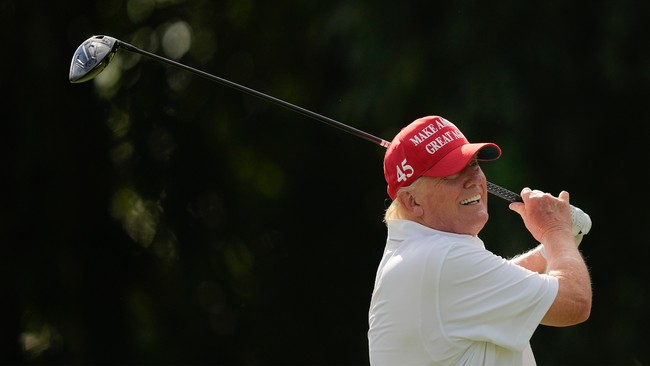

The Supreme Court has settled the issue of whether some “dangerous” people can be denied gun rights, but its ruling last week won’t shut down the tidal wave of gun cases surging toward the justices.
Already brewing in district and appeals courts are disputes over bans on semiautomatic rifles, restrictions on how often guns can be purchased and where they can be carried, and whether illegal immigrants and drug users can legally possess firearms.
The justices issued an 8-1 ruling Friday that said the Second Amendment allows governments to ban gun ownership from someone who has been deemed a danger to society, at least temporarily, and that someone facing a domestic violence restraining order falls into that category.
Beyond that, the court must wait for other cases to settle questions about Second Amendment rights, Justice Neil M. Gorsuch wrote.
“We do not resolve any of those questions (and perhaps others like them) because we cannot. Article III of the Constitution vests in this Court the power to decide only the ‘actual cas[e]’ before us, ‘not abstractions,’” Justice Gorsuch said in a concurring opinion to the decision. “Nor should future litigants and courts read any more into our decision than that.”
The case before the justices involved Zackey Rahimi, who was found with a gun after having been slapped with a domestic violence restraining order in Texas. Under federal law, that order made him a prohibited person for firearms possession.
He argued that the court’s landmark 2022 ruling in New York State Rifle & Pistol Association Inc. v. Bruen had rewritten the legal standards for gun laws and that the prohibition involving restraining orders was unconstitutional.
The 6-3 ruling in Bruen created a history test: For a law to survive Second Amendment scrutiny, it must have been the type of restriction the founders would have countenanced.
A flurry of challenges followed. Felons, illegal immigrants and others argued that they should maintain their gun rights because they wouldn’t have been prohibited at the time of the founding.
Even President Biden’s son Hunter Biden has argued that his conviction for possessing a weapon as an unlawful drug user should be overturned under Bruen.
Lower courts have split on each of those questions.
“The message that lower courts are sending now in Second Amendment cases could not be clearer. They say there is little method to Bruen’s madness,” Justice Ketanji Brown Jackson, who was part of the majority in Friday’s ruling, wrote in her concurring opinion.
Indeed, many of those lower courts put their gun cases on hold to wait for Supreme Court guidance in the Rahimi ruling.
The Second Amendment Foundation, a gun rights group involved in many of the cases, said the high court failed to deliver.
“This makes it all the more important the Court take any number of other Second Amendment cases at its door, to further clarify that the Second Amendment protects a pre-existing, fundamental individual right and how to appropriately conduct the analysis Bruen requires,” the foundation said.
Rahimi, the man at the center of the case, had what prosecutors called a series of reckless shootings but hadn’t been convicted.
After a tense encounter with an ex-girlfriend, he was slapped with a restraining order. Section 922(g) of federal gun laws prohibited him from possessing a firearm, but he was found with one anyway.
A federal court convicted Rahimi of illegally possessing a gun, but he challenged it as unconstitutional. The 5th U.S. Circuit Court of Appeals initially upheld the conviction but reversed itself after the Bruen ruling. It said it couldn’t find any analogy in the founders’ history for a ban on guns by those facing protective orders.
Chief Justice John G. Roberts Jr., writing the key opinion in Friday’s ruling, said Bruen doesn’t require an exact analogy. He said the principles of the founders — that some people are dangerous enough to lose their gun rights — are enough to cover Rahimi’s case.
“Since the founding, our nation’s firearm laws have included provisions preventing individuals who threaten physical harm to others from misusing firearms. As applied to the facts of this case, Section 922(g)(8) fits comfortably within this tradition,” the chief justice said in upholding the federal law.
Justice Clarence Thomas, who wrote the Bruen decision, dissented from the ruling. He said history has no tradition of disarming people without a criminal record.
“Thus, the question before us is not whether Rahimi and others like him can be disarmed consistent with the Second Amendment,” Justice Thomas wrote. “Instead, the question is whether the Government can strip the Second Amendment right of anyone subject to a protective order — even if he has never been accused or convicted of a crime. It cannot.”
Legal scholars said the ruling’s result is that people deemed credible physical threats can lose their guns, at least temporarily, even if without a court conviction. Future cases will have to determine who qualifies as a danger.
Scholars described the ruling as somewhat of a do-over of Bruen, with the justices grappling with the implications of their earlier case.
All three of President Trump’s nominees to the high court wrote opinions trying to lay out paths forward.
Justice Amy Coney Barrett said originalism doesn’t trap courts to the limits of what the founders.
“Despite its unqualified text, the Second Amendment is not absolute. It codified a preexisting right, and preexisting limits on that right are part and parcel of it,” she wrote.
Justice Brett M. Kavanaugh defended the history test but said Second Amendment interpretation “is still in the relatively early innings.”
He said the high court’s precedent recognizes that the Second Amendment has some limitations and that precedent takes history into account.
Justice Gorsuch said judges can disagree over how they see history but it’s the only way to approach these sorts of constitutional questions.
“Discerning what the original meaning of the Constitution requires in this or that case may sometimes be difficult. Asking that question, however, at least keeps judges in their proper lane, seeking to honor the supreme law the people have ordained rather than substituting our will for theirs,” he wrote. “And whatever indeterminacy may be associated with seeking to honor the Constitution’s original meaning in modern disputes, that path offers surer footing than any other this Court has attempted from time to time.”
Justice Sonia Sotomayor, who dissented from the 2022 decision, said she remained “troubled” by Bruen and making history the key test for gun laws.
“History has a role to play in Second Amendment analysis, but a rigid adherence to history, (particularly history predating the inclusion of women and people of color as full members of the polity), impoverishes constitutional interpretation and hamstrings our democracy,” she wrote.
Rahimi’s case is the second major gun ruling of the Supreme Court this term.
Earlier this month, the justices overturned a 2018 decision by the Bureau of Alcohol, Tobacco, Firearms and Explosives to redefine bump stocks as machine guns.
Bump stocks allow semiautomatic firearms to mimic the rate of fire of automatic weapons.
In a 6-3 ruling with Justice Thomas writing the lead opinion, the court said the definition Congress wrote into the law for what is a prohibited automatic weapon doesn’t match bump stocks. The majority said Congress could attempt to ban bump stocks but a unilateral executive decision to reinterpret the definitions cannot.

















